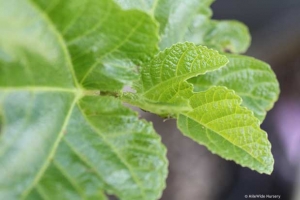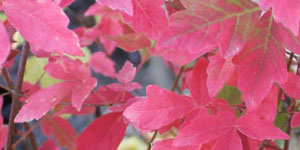|
Ficus carica without any specific name is a common fig -
our current stock is Black Mission fig (an 80 yr old
gardener gave me the tree over 15 yrs ago). I grow this
in my own yard and it makes a dark brown fig that is
quite tasty. The inner pulp is rose-tinted when ripe.
Milewide has recently acquired ficus carica "Turkish"
and ficus carica "afghanistanica" mothers, but we won't
have cuttings ready for a year or two. They are both
known to be hardy.
Figs, and You Guessed It,
More Figs!
Figs, Figs, Figs!
People love figs! Every time we go to the farmer's
market or do an open house, the fig trees are the first
to go. When we decided to propagate them, we had no idea
they were such a popular fruit and tree. But it makes
sense, have you ever seen fresh figs at the market??
Dried, sure. But fresh? They don’t keep, so the only
way to have one, is to grow your very own tree.
Figs grow best in a
dryer warm-temperate climate, similar to the
Mediterranean. If there is rain while the tree is
fruiting, the fruit may split and therefore rot. But if
you have the right environment, figs will grow to be
anywhere from 10 to 50 feet tall (averaging around 30
feet). The leaves are large, bright green and have 3-5
lobes. The bark is a whitish-gray color. The branches
spread wider then the tree is tall, but break easily.
Often older fig trees will have large nodes from where
branches have fallen off. The fig in our front yard (we
are located in Zone 9) is humongous and during fruiting
season we are hard pressed to pick them all.
When I was young I would climb the fig in our yard and
read. Being a curious child, I would climb around and
pick leaves and unripe fruit to look at the inside.This
is how I discovered the sap of a fig tree is poisonous.
Nothing dangerous mind you, but it contains a milky
white latex which is irritating to the skin. And if you
happen to get some in your mouth if makes your tongue go
numb.
Black Mission fig leaves.
 The
flowers are tiny and located inside of a syconium, an
enlarged, fleshy, hollow receptacle with multiple
ovaries on the inside surface. Ficus Carica “Black
Mission” figs are solely female and need no pollination
to bear fruit. The only other method of pollination for
this inverted flower, is a tiny “fig wasp”. This wasp
and figs have had a symbiotic relationship for going on
80 million years. When the fruit is ripe it will be a
muddled brown color with bright redish-pink seeds
inside. The distinct nutty taste often associated with
figs is only present if the seeds were pollinated. It is
important to note, figs will not bear fruit unless in
full sun the majority of the day. It is also important
to note, the trees canopy will shade out anything
growing beneath. Our fig is next to our garden, and
every year must be severely cut back to allow sun to our
vegetable beds. In addition, the root mass is extremely
dense. The veggie bed closest to our fig has been
forfeited for the sake of the fruit. The
flowers are tiny and located inside of a syconium, an
enlarged, fleshy, hollow receptacle with multiple
ovaries on the inside surface. Ficus Carica “Black
Mission” figs are solely female and need no pollination
to bear fruit. The only other method of pollination for
this inverted flower, is a tiny “fig wasp”. This wasp
and figs have had a symbiotic relationship for going on
80 million years. When the fruit is ripe it will be a
muddled brown color with bright redish-pink seeds
inside. The distinct nutty taste often associated with
figs is only present if the seeds were pollinated. It is
important to note, figs will not bear fruit unless in
full sun the majority of the day. It is also important
to note, the trees canopy will shade out anything
growing beneath. Our fig is next to our garden, and
every year must be severely cut back to allow sun to our
vegetable beds. In addition, the root mass is extremely
dense. The veggie bed closest to our fig has been
forfeited for the sake of the fruit.
Although this tree takes up a massive amount of space
when given the chance, and makes a mess when the leaves
drop each winter, the delicious, abundant and beautiful
fruit is well worth it. Some days I look out the window
and think of all the other things I could do with the
space taken up by our fig, yet year after year it
remains standing. I believe it’s well worth the
sacrifice.
Stephanie
ps - Once you have your own fig, they are very easy to
propagate. In late spring, take 6 inch stem-tip cuttings
and poke them into cells/pots under a dome cover - keep
them moist, but not wet. They want warmth now, but no
direct sunlight. Give the young starts about 4 to 6
weeks to root. I seem to have more success when I leave
a bud on the cutting, but no leaves. When they root up,
transplant them into a larger pot and let them get going
in a shady place. When well rooted, well, then, go for
it.
Steve
|
